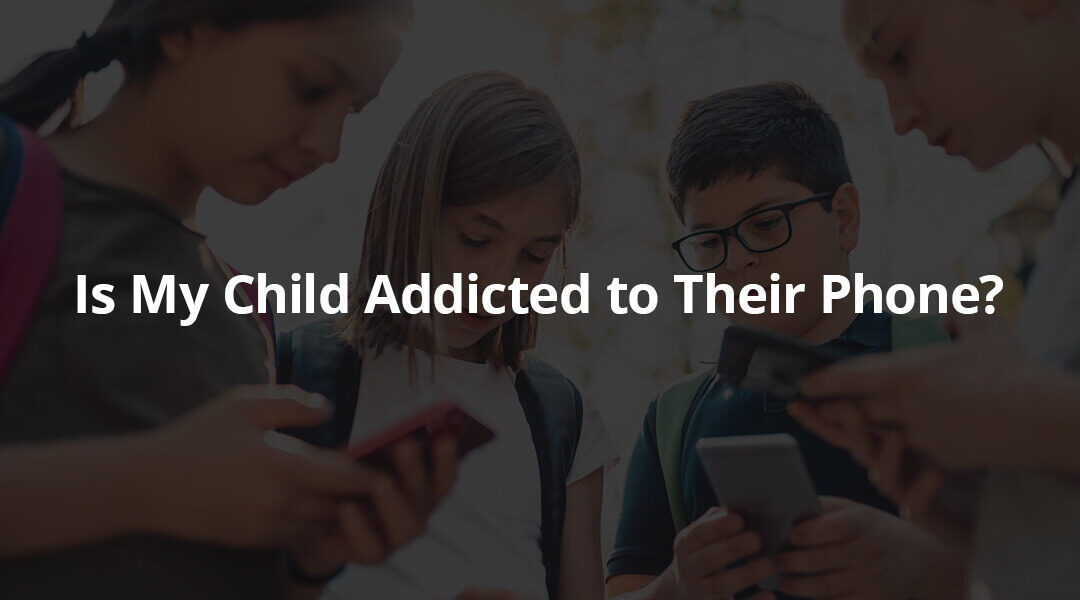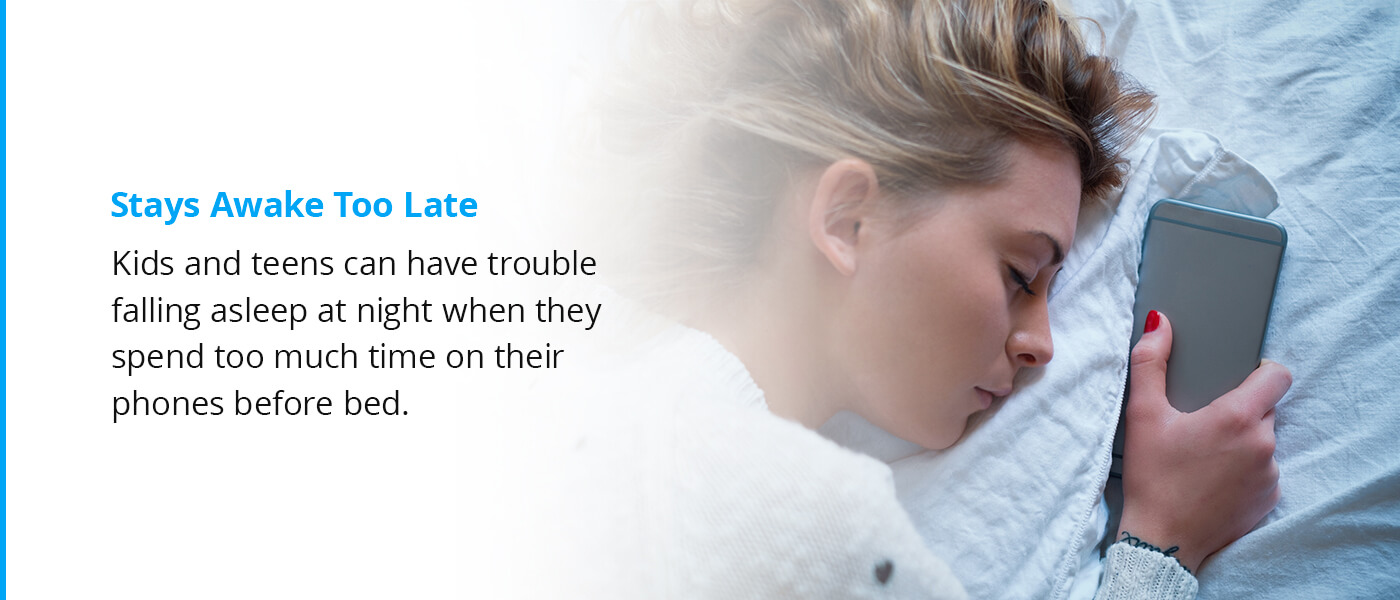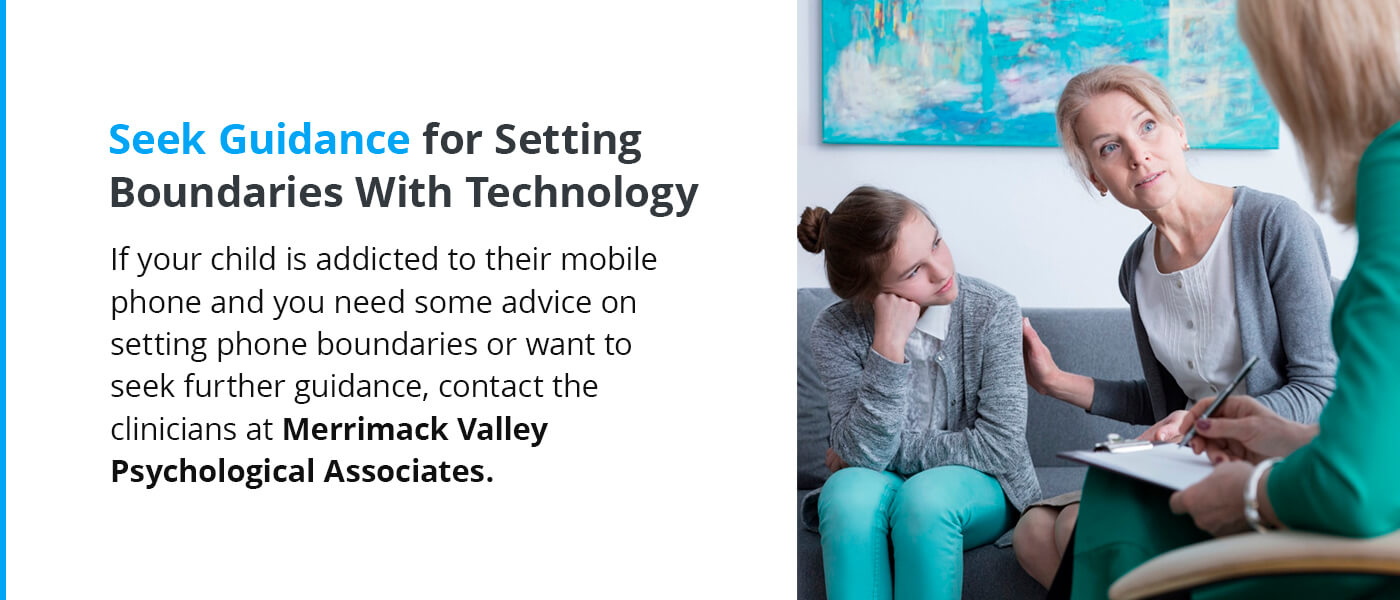Smartphones, tablets and other devices have become an integral part of society. With endless apps, social media sites and the ability to contact friends and family in an instant, smartphones grab people’s attention easily. While cell phones are a helpful device to stay connected with your child, when does reliance on a cell phone transform into a cell phone addiction? Children have a complex relationship with their cell phones and technology. Using technology in the classroom and expanding their social lives through social media, technology follows them in all aspects of their lives. It’s helpful to recognize problematic smartphone use if you suspect your child is too fixated on their cell phone. Learn the common signs your child is addicted to their phone and how you can set phone boundaries to ease the situation.
5 Signs Your Child is Addicted to Their Phone
An actual cell phone addiction is quite rare, but it can sometimes feel like your child has an obsessive habit of using their smartphone. Children and teens often feel pressure from their peers to frequently respond to messages and establish an active social media presence. Smartphones give children and teens an easy way to connect and are a source of entertainment. Your child may find their phone entertaining and likely a necessity of their day. You can appreciate the ability to stay connected with them and communicate in case of an emergency, but how much time spent on their phone is too much? What signs should you look out for if you think your child is addicted to a mobile phone? According to the American Academy of Pediatrics, the average child aged 8 through 12 spends 4.5 hours a day on screen devices, and teenagers ages 13 through 18 spend around 6.5 hours a day. These time averages contributed to many children’s reliance on their cell phones and other smart devices. When phones begin to impact your child’s life negatively, then it might be time to intervene. Learn some of the common signs that your child is beginning to become too dependant on their phone and how less time on their device would improve their life.
1. Stays Awake Too Late
Children and teens have a variety of entertainment and communication options on their smartphones. They can watch TV shows, play addicting games or message their friends. It’s easy for them to bring their phones to bed to occupy themselves before falling asleep. But cell phones may be negatively impacting your child’s sleep schedule or ability to fall asleep at a decent hour. Smartphones and other screen devices emit blue light waves. While blue light has benefits like energy efficiency, it can impact the quality of your sleep. Blue light can suppress the release of melatonin in your body, which allows you to fall asleep and have quality rest throughout the night. Kids and teens can have trouble falling asleep at night when they spend too much time on their phones before bed. This can become a problem if they become too tired and irritable during the day because of their lack of sleep.
2. Grades Begin to Slip
Phones can easily become a distraction from schoolwork. Phones are usually restricted during school hours, but phones can still become a distraction during the day and after school when children are working on homework or projects. A sign to look out for if you’re concerned about the impact your child’s smartphone is having is if their grades begin to slip or they begin to become severely uninterested in their schoolwork.
3. Commonly Expressing Moods of Anixousness or Anger
While strong emotions of anger, anxiety and other moods can stem from other causes, cell phone addictions can be often be a common culprit. When all your child wants to do is use their cell phone to go online, pass the time or talk to their friends, other activities might sound pointless. Fun hobbies they once enjoyed can be on the back burner because of their phone. Mentioning taking their phone away or asking them to put their phone down for any reason may result in these strong emotions.
4. Needs to Respond Immediately to Messages
Many teens and children expect immediate responses on their smart devices. Whether it’s an app loading fast, videos playing immediately or getting text messages back quickly from their friends, many things in their lives are instantaneous. If your child is addicted to their phone, something to look out for is having an intense urge to respond to every message they receive as soon as it comes in. They’ll likely always have their phone in their hand and have to charge their phones multiple times a day to prevent the battery from dying.
5. Experiences Social Challenges Because of the Cell Phone
Kids who have a dependency on their cell phones may encounter socializing challenges like making new friends in person instead of through social media, texting their friends in the same room instead of talking or having arguments or confrontations online rather than in person. Your child may find it easier to interact with their friends through texts or online. While phones make it easy for people to communicate, it’s still essential that kids and teens have quality human interactions for their development. Communicating online can be especially unhealthy for kids when it comes to fighting online or cyberbullying.
Do You Recognize Those Signs in Yourself?
Pointing out signs that your child is addicted to their cell phone can be simple, but it takes more effort to recognize these signs in yourself. It’s important that children and adults both recognize that they may become addicted to their mobile phones. Cell phone addictions can impact the relationship parents have with their children. Smartphones make it easy to communicate with your child, answer work emails, make a grocery list and connect with friends, but noticing when you’re spending too much time on your phone is the first step to practicing more distance between you and your device. Your child will also notice how you interact with your phone. Showing that you can easily put your phone down and enjoy other activities or conversations is an excellent way to ease your child off of their phone.
Seek Guidance for Setting Boundaries With Technology
Setting phone boundaries and limiting screen time is one of the best approaches a parent can take when they’re concerned about their child’s obsession with their smartphone. If your child is addicted to their mobile phone and you need some advice on setting phone boundaries or want to seek further guidance, contact the clinicians at Merrimack Valley Psychological Associates. Schedule an appointment today or learn more about the services we can provide for all ages.
Reviewed By
Dr. David Rainen, PsyD.
I am a licensed clinical psychologist with an extensive background treating a variety of different ages, situations, emotional and mental health disorders in individuals and their families. As part of my 10 year professional and training career in psychology, I have developed and refined my skills and approaches through my work in a variety of diverse settings including: hospitals, community outpatient facilities, college counseling centers, secure and unsecure inpatient/residential treatment programs, and therapeutic day schools.




